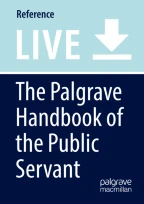
Governments design and deliver public infrastructure, public services, and regulatory frameworks to meet the current and future challenges facing their societies and their economies. Their general aim is to do good. But to do good, they have to be good.
They need sufficient capacity to act where public action is required. And they need to possess genuine capability so as to generate and realize positive change for the better. Good intentions and ample resources are not enough to deliver good outcomes. Citizen-focused and evidence-based approach to policy making can ensure that the right public policies are being pursued. But are they being implemented in the right way, and are politicians and public servants doing the right things to assure cost-effective and trustworthy government action?
Public ethics and citizens’ experience of fairness lie at the heart of good public services. And it is why the ethical behavior of politicians, senior public executives, and mainstream public servants is central in shaping the overall ability of governments to do good.
Considerations as to what constitutes ethical behavior (both positive and negative) will vary across nations and cultures. But despite this, there are widely accepted practices of good behaviors that need to be encouraged and bad behaviors that need to be eliminated. This chapter brings questions of ethics and fairness to the foreground. It outlines how virtue-based ethics (to doing the right thing) can complement more normative as well as consequence-based ethical approaches.
This is a preview of subscription content, log in via an institution to check access.